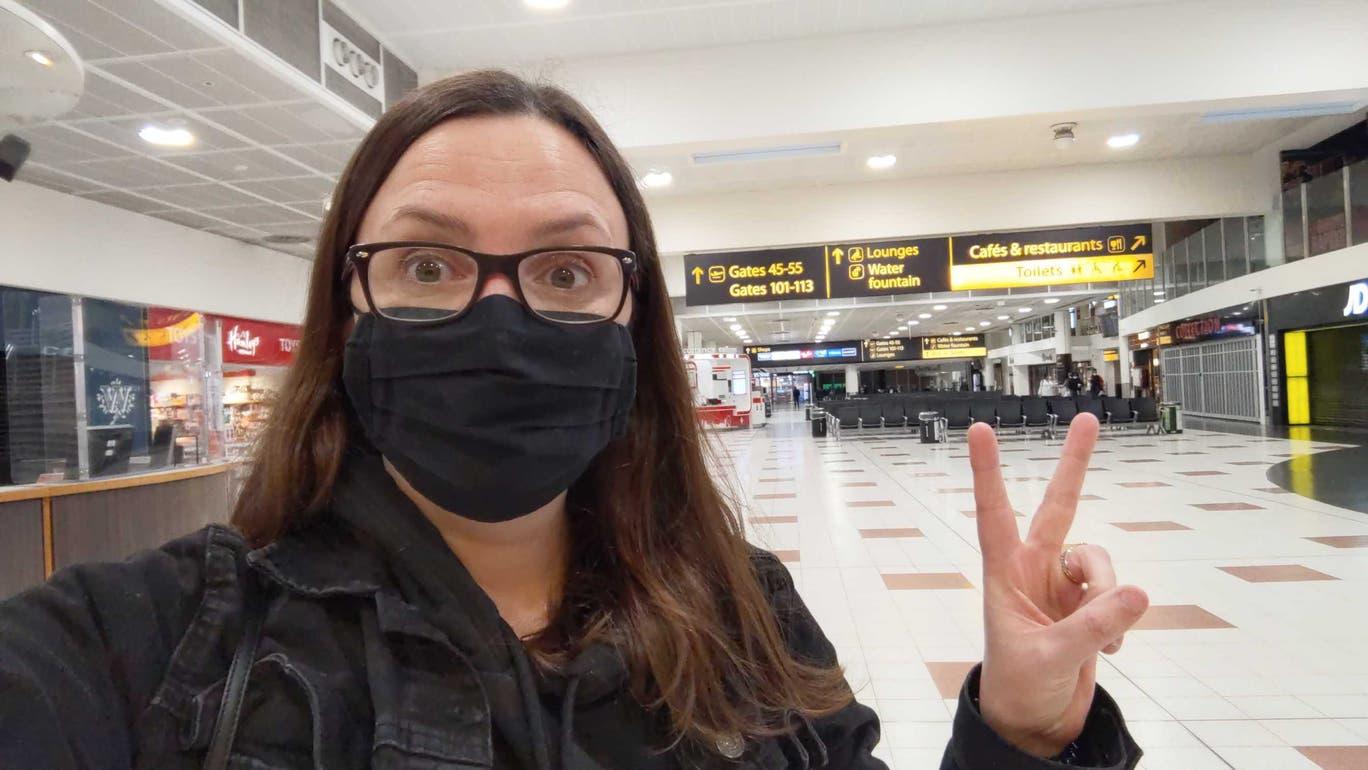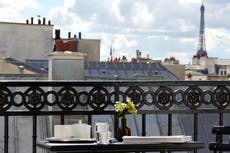Brexit, New York day trips and jobbymoons: What I’ve learnt in three years as travel editor of The Independent
Modern travel might be an obstacle course of nasal swabs and health declaration forms, but it’ll still be worth it, says Cathy Adams


Your support helps us to tell the story
From reproductive rights to climate change to Big Tech, The Independent is on the ground when the story is developing. Whether it's investigating the financials of Elon Musk's pro-Trump PAC or producing our latest documentary, 'The A Word', which shines a light on the American women fighting for reproductive rights, we know how important it is to parse out the facts from the messaging.
At such a critical moment in US history, we need reporters on the ground. Your donation allows us to keep sending journalists to speak to both sides of the story.
The Independent is trusted by Americans across the entire political spectrum. And unlike many other quality news outlets, we choose not to lock Americans out of our reporting and analysis with paywalls. We believe quality journalism should be available to everyone, paid for by those who can afford it.
Your support makes all the difference.At no other time since perhaps 9/11 and the easyJet generation of the early noughties has travel been so disruptive – and disrupted. Whether that’s Covid travel restrictions; the “flight shame” revolution; the opening up of previously shuttered countries and communities to tourism; or Brexit, the past few years have exposed a world in which the only constant is change.
I landed at The Independent following a stint editing an inflight magazine in Hong Kong; which is a travel journalism job that shares very little DNA with a role running the travel desk of a national newspaper. (For starters, I realised pretty quickly that my meetings wouldn’t all take place in the Mandarin Oriental hotel.)
Travel has long been The Indy’s “thing”, its profile raised by the inimitable Simon Calder who has been at the paper almost as long as I’ve been alive. This made it an easy job to accept; the only problem being I knew nothing about digital and everything about magazines (the paper went online-only in 2016). I had a grasp of what made places interesting to a tourist; how to write about destinations without making them sound fresh out of the Thomas Cook brochure; and I knew my Airbus A320s from my Boeing 737s. How to write for a hungry digital audience, though, was a crash course.
Over the next few years I squashed in trips to Asia, the Caribbean, North America and the length and breadth of Europe, staying in new hotels, test-driving new initiatives dreamed up by innovative tourism boards and talking, talking, talking to as many people as I could. All the while reporting on the tragic Boeing 737 Max plane crashes, the mangled Brexit negotiations and angry people on planes.
When I left in March 2020 to have a baby, I left as a travel editor where the lion’s share of the job was sifting through the world to find the zingiest destinations, the hottest hotels and the most interesting new attractions, as well as travelling fairly regularly.
I returned in January 2021 as a shellshocked new mother who could do little more than patch together stories with boilerplates of “international travel is illegal”. Despite being added to roughly 12 stories a day until international travel was permitted again from 17 May, it was always a ludicrous thing to write. Gone were any stories from locations as far-flung as Panama, Peru or even Portugal. We commissioned a lot of UK walking stories instead.
As a travel journalist who craves novelty and the texture of a life spent pinballing around the world, being locked into the few square miles around my house during the year’s most miserable months was a test perhaps greater than parenthood.
But it also afforded me a deep understanding of just how desperate the British public were to travel and get back out into the world again. For the first time, once quick weekends in Barcelona weren’t taken for granted, I truly grasped how outsized a part of British life travel played. Whether that was to visit friends and family, or to go on holiday, which for months was a dirty word, readers were as keen as I was to leave. We knew this because stories with headlines like “when can I leave the UK again?” were our most-read stories for months, even though there was nothing new to say.
If you’ll forgive the self-indulgent ramblings of a travel editor, here’s what I’ve learnt in some of the weirdest three years to be writing about travel.
Going to New York for a day is never a good idea
The fact that The Independent is digital-only gives us licence to be creative and reactive when it comes to writing about travel. However, some ideas are best destined for the travel writing museum than others.
Just before sustainable travel became as urgent a concern as it has, I thought it’d be a great idea to introduce a “micro-trip” series, where writers explored cities for a day and filmed the whole thing. To this end, me and a video journalist dispatched ourselves to New York for eight hours to cream off the best experiences in the city, mostly in the rain.
Was I mad? Who was ever going to fly to New York for a day?
Nobody is really interested in leaf peeping...
There are things I refuse to believe the British public are interested in, but which get recycled by the travel marketing lobby every year regardless. (I fear this article might be one of them.)
The top one is “leaf peeping”. Has anybody ever booked a trip to New England to ogle the changing colours of the autumn leaves? If you’re the unicorn that has, please do let me know.
...but they are interested in under-the-radar destinations
No stories would do better among The Independent’s free-thinking audience than passion pieces written by residents in cities such as Tirana, Addis Ababa and Porto. As various destinations got swallowed whole by “global swarming” (notably Venice, Amsterdam and Bali), we instead directed people to the second, third, fourth cities in a country. And readers loved them.
Britons are desperate to travel again
Nothing clarified this point as much as seeing the number of people reading articles, deep in the third lockdown at the start of 2021, with headlines such as “when can I go on holiday?”. These “explainers”, as we call them, were the best-read travel articles for months. Questions flooded in from readers asking whether their summer holiday could go ahead, and the honest answer was and is still: we don’t know.
Simon Calder is as nice as he seems on TV
He also knows absolutely everything about trains and planes.
Travel can always produce the worst portmanteaus
In travel marketing, no word has escaped the curse of having “moon” added onto the end of it: babymoon, friendmoon, or the most egregious of the genre, jobbymoon. Ditto, “-cation”.
The climate crisis has shaken the travel industry...
…and we’re still figuring out how to balance writing about travel and the realities of the world we live in. Our quality of life has soared simply because of easier, cheaper and safer air travel, while aviation has facilitated the transfer of wealth to poorer countries, and aided cultural understanding. It’s allowed families to reconnect, languages to be learnt and life-affirming experiences to be had.
The Independent has led by example with dedicated climate coverage, championing responsible tourism operators and lingering on slow travel, but that alone isn’t going to single-handedly reduce the 2 per cent of CO2 that gets dumped into the atmosphere from aviation each year. I still believe that tourism still has the potential to lift entire communities, but we urgently need to change how we travel. I’m still guilty of flying too much, even though I’m personally hopeful for the innovations into electric planes and sustainable fuel by airlines.
Nobody understands the travel restrictions – not even travel editors
Right now I’m wading through the finer details for a trip to Mallorca this weekend: organising PCR testing for our return, booking a villa and making sure my NHS Covid Pass is sound, all at nosebleed speed. That’s before the Balearics get inevitably slung onto the “amber plus” list and we have to repeat the whole process for Portugal instead.
But not even multiple nasal swabs will put me off travel
Even the thought of a handful of nasal swabs necessary for a return trip to the Mediterranean makes my heart sing more than the thought of a weekend spent at home. It’s all very well judging people for wanting to race into the sun when you’re holed up in a lovely beachfront cottage in St Ives: but for many families, a week in Spain is typically cheaper than Center Parcs.
I will always believe in the power of travel – to unite communities, to boost mental health, to improve cultural understanding. On a less tangible note, there’s no greater feeling than waking up somewhere new with the whole day spooling ahead of you; or walking out into the early evening sun in some Mediterranean village, eyeing up a beer. That’s why I’ll continue to do it, PCR tests and PLFs and all.



Join our commenting forum
Join thought-provoking conversations, follow other Independent readers and see their replies
Comments